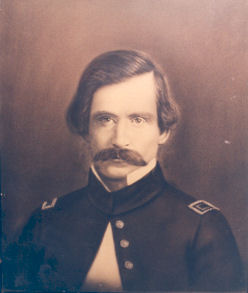150 years ago yesterday, Major Robert Anderson, commander of Ft. Sumter, agreed to surrender on April 15th if he did not receive additional supplies. But at 3:20 AM the next day, General Beauregard received the news that the ships carrying reinforcements were gathering outside Charleston. Since their arrival was so imminent, he sent a message to Anderson telling him that he would open fire in one hour.
 |
| Captain George James |
Roger A. Pryor, a Virginia politician who since his own state would not secede had come to South Carolina to urge the attack on Fort Sumter, was offered the opportunity to fire the first shot, but he refused saying, "I could not fire the first gun of the war." Therefore Captain George S. James, the commander of the battery, fired the first shot of the siege at 4:30 AM. The Civil War had begun.
The firing of the mortar woke the echoes from every nook and corner of the harbor, and in this the dead hour of the night, before dawn, that shot was a sound of alarm that brought every soldier in the harbor to his feet, and every man, woman and child in the city of Charleston from their beds. A thrill went through the whole city.1
Fort Sumter answered at 7:30 AM, firing accurately and slowly. The fort was designed to resist a naval attack from the ocean, so the only guns that could be safely fired could not fire directly on the opposing Confederate works. Even though both sides were low on ammunition, they continued firing throughout the night and into the next day.
 |
| Firing on Fort Sumter |
Fox, the commander of the naval relief expedition, ordered small boats to be sent into the harbor with supplies. However, they were deterred by the artillery fire. At night the sea was too boisterous to land, so Fox hoped the fort would hold out until the next night so it could be relieved.
1. Battles and Leaders of the Civil War Source p. 77




2 comments:
The Union Forever....
Outnumbered 2-1 and going up against a manufacturing giant. CSA FOREVER!
Post a Comment